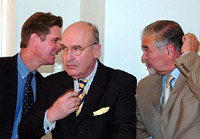Yesterday the co-chairmen of the OSCE Minsk Group were in Yerevan again. They as usual met with the RA president Serzh Sargsyan and again held a press conference and again didn’t say anything new.
Usually press conferences are held when there is something new to be said. As of the Minsk Group this rule doesn’t work for them. They come, meet, give unclear answers and leave. The Armenians find out new information about the NKR from the American co-chairman Mathew Bryza’s statements made in other countries. That is the reason why most of the questions are directed to him (however Bernard Fassier was asking the journalists to ask questions without concrete address and they will decide who is to answer the question). Nevertheless, Mathew Bryza with his typical American smile has to refute his or his bosses’ statements. This time he had to figure out ways to get rid of the statements of the State Secretary Hillary Clinton. To the question of one of the journalists as where does the optimism of Hillary Clinton come from in terms of the regulation of the NKR conflict, where she said that the conflict will be resolved within a month, Bryza said that Clinton didn’t say within a month. She said within several months. From his part Bryza said that it is possible that the conflict may be resolved shortly. Let’s mention that before answering the questions the French co-chair had made a brief introductory speech by saying that they often go out to the region, have meetings with the presidents of Azerbaijan and Armenia. They had worked pretty long with them and reached the agreement to meet in Prague on May 7. The Presidents of Armenia and Azerbaijan, Serzh Sargsyan and Ilham Aliyev, have confirmed their willingness to have a meeting in Prague on May 7. "The Prague meeting can be of great importance. It will be constructive and productive like the three previous meetings in Saint Petersburg, Moscow and Zurich," said French Co-Chair Bernard Fassier. The Co-Chairs assessed the agenda of the Prague meeting which will highlight a number of issues left disagreed during the previous meetings. Bernard Fassier said the Madrid Proposals still remain on the negotiation table and many provisions are going to be discussed in Prague by Presidents Sargsyan and Aliyev. The French co-chair advised paying attention to the Azerbaijani president’s statement in Moscow during which Ilham Alieyev made unprecedented statements on "self-government." Journalists observed that Alieyev had also announced that "the Karabakh conflict cannot be regulated at the expense of the territorial wholeness of Azerbaijan." The journalists asked why the co-chairmen haven’t visited Karabakh this time. It turns out that the reason is purely technical. “We did not visit Stepanakert because of unfavorable weather, instead we had a phone conversation with the NKR President Bako Sahakyan,” said Fassier. The co-chairs are sure that the upcoming meeting of the two presidents will be productive just like the last three ones. What is the basis of optimism? In the words of the Russian co-chair Yuri Merzlyakov there are no such grounds. There are only conditions, which speed up the process. It seems Fassier is more optimistic. He thinks that there are wise hopes and the recent developments are the best evidence of that. By the way the American and French co-chairs have unique approach about those developments. For example, Mr. Fassier was impressed with the statement of Aliyev, in which he spoke about the safety issues of the population of the NKR. Bryza in his turn rushed to speak that Aliyev had spoken about autonomy. All this gives unprecedented optimism to the co-chairs. Bryza also mentioned the three important provisions, which the two sides had agreed upon. Those are the right of identification, territorial integrity and refusal of use of force. Fassier reminded of the words of the former foreign affairs minister of France, who had said, “Even improper compromise is better than war.” "The agreement reached between the Foreign Ministries of Armenia and Turkey with the mediation of Switzerland could have a positive influence on the whole region," the Co-Chair declared, adding that the resolution of the Karabakh conflict and the establishment of the Armenian-Turkish relations would proceed separately. Matthew Bryza noted that the USA has always welcomed the normalization of ties. "The USA supports the parties’ rapprochement without any preconditions." The normalization of relations would be a good basis for regional development. The rapprochement of the two countries reflects the positive energy in the region, and this energy benefits Armenia, Azerbaijan and the Karabakh solution." Is the issue of NKR included in the road map document in a separate clause? The co-chairs didn’t say anything about it because the document is still closed. At any rate, they think that the NKR conflict resolution and normalization of Armenian-Turkish relations are separate issues. Is it possible that a similar road map may be signed between Armenia and Azerbaijan? The co-chairs didn’t exclude that but didn’t wish to mention dates. According to Merzlyakov after agreeing upon basic principles it will be possible to elaborate a text of consent. But this depends only on the co-chairs. As of the societies, which may or may not accept the agreement of the residents the co-chairs were pretty calm about this as well. Indeed, Fassier agreed that there was a moment that they had felt that the two presidents are not too concerned about preparing their societies to the changes. However, at present the presidents are willing to prepare their peoples to the expected resolutions. Shortly said, if the optimism of the co-chairs is justified then we should get ready to be prepared.

